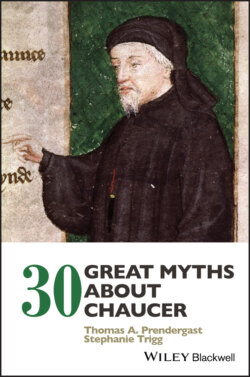Читать книгу 30 Great Myths about Chaucer - Stephanie Trigg - Страница 15
Notes
Оглавление
1 1 In this sense, Chaucer’s career fits the model outlined by Richard Helgerson for Renaissance poets, in Self‐Crowned Laureates: Spenser, Jonson, Milton, and the Literary System (Berkeley, CA: University of California Press, 1983), 80–82, where it fits a model first exemplified by Virgil. L . Lipking, The Life of the Poet: Beginning and Ending Poetic Careers (Chicago, IL: University of Chicago Press, 1981), xi, 76–80.
2 2 William Godwin , The Life of Geoffrey Chaucer, the Early English Poet including Memoirs of his near friend and kinsman, John of Gaunt, Duke of Lancaster: with sketches of the Manners, Opinions, Arts and Literature of England in the Fourteenth Century, 4 vols., 2nd edn. (London: Printed by T. Davison for R. Phillips, 1804), II:372.
3 3 Qtd. in Godwin, II:369–70.
4 4 Margaret Galway , “Chaucer’s Hopeless Love,” MLN 60, no. 7 (1945), 431–9.
5 5 Froissart refers to her as “cette jeune damoiselle de Kent,” but she does not seem to be called the “Fair Maid of Kent” in any contemporary authority. Les chroniques de Sire Jean Froissart, vol. II (Paris: Wattelier, 1867), 243.
6 6 Galway, “Chaucer’s Hopeless Love,” 433.
7 7 Margaret Galway , “Chaucer’s Sovereign Lady: A Study of the Prologue to the ‘Legend’ and Related Poems,” MLR 33, no. 2 (1938), 145–99 , here 176.
8 8 Thomas Tyrwhitt was first to identify Alceste with Queen Anne; Paul Strohm , Hochon’s Arrow (Princeton, NJ: Princeton University Press, 2014), 116–19 , concurs with this view. For the less common association with Queen Philippa’s damoiselle, Alice Cestre, see Frederick Tupper , “Chaucer’s Lady of the Daisies,” Journal of English and Germanic Philology 21, no. 2 (1922), 293–317.
9 9 Edward Condren , “The Historical Context of the Book of the Duchess: A New Hypothesis,” Chaucer Review 5, no. 3 (1971), 195–212 , here 208.
10 10 J.M. Manly, “Chaucer and the Rhetoricians: Warton Lecture on English Poetry, no. 17, read before the British Academy June 2nd, 1926,” Proceedings of the British Academy 12 (London: Humphrey Milford, 1926), 110. This is often misquoted as “thin prettiness.”
11 11 Derek Pearsall , The Life of Geoffrey Chaucer: A Critical Biography (Oxford: Blackwell, 1992), 84.
12 12 The Chandos Herald described her as “Que bêle fut, plesante et sage” in his life of Edward, Prince of Wales, written some time between 1376 and 1387. See Le prince noir poème du héraut d’armes Chandos: texte critique suivi de notes par Francisque‐michel (London: J.G. Fotheringham, 1883), 106: “A une dame de grani pris / Qui de s’amour l’avoit espris, / Que bêle fut, plesante et sage” (ll.1586–8). Froissart refers to her “en son temps la plus belle de tout la roiaulme d’Engleterre et la plus amoureuse” (II:243).
13 13 Stephanie Trigg , Shame and Honor: A Vulgar History of the Order of the Garter (Philadelphia, PA: University of Pennsylvania Press, 2012), 27.
14 14 Ibid., 65; Leo Carruthers, “‘Honi soit qui mal y pense’: The Countess of Salisbury and the ‘Slipt Garter,’” in Surface et Profondeur: Mélanges offert à Guy Bourquin, ed. Colette Stévanovitch and René Tixier, Grendel 7 (Nancy: AMAES, 2003), 221–34, here 232.
15 15 Anya Seton, Katherine (1954; London: Hodder and Stoughton, 2006).
16 16 Ibid., 45.
17 17 See, for example, Duane Crowley’s Riddle Me a Murder (Manchaca, TX: Blue Boar Press, 1986), whose plot depends on a brief romance between Chaucer and Blanche that led to the birth of Henry Bolingbroke, the “son” of John of Gaunt who would become Henry IV. See also Myth 27 about Chaucer’s deathbed retraction.
18 18 Pearsall, Life of Geoffrey Chaucer, 83, n.37. Pearsall is referring to Godwin’s Life of Geoffrey Chaucer and George Williams’s A New View of Chaucer (Durham, NC: Duke University Press, 1965). More specifically, he rejects outright the idea that The Book of the Duchess was written uninvited by Gaunt: “The poem could hardly have been written without Gaunt’s knowledge, and it is natural to assume that it bespeaks a certain intimacy. A young pipsqueak of an esquire would not have presumed to write on such a subject in such a way had he not been assured of a sympathetic reception” (84).
